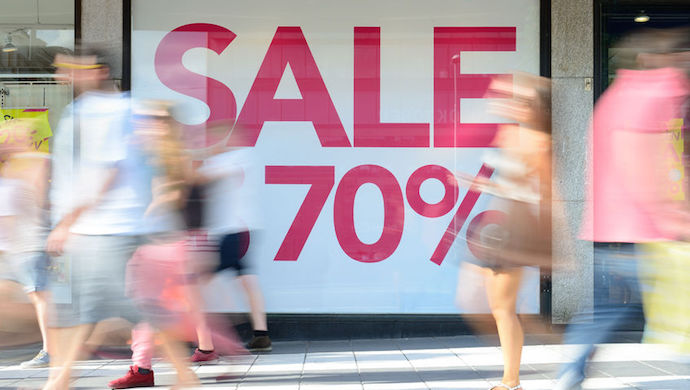Yes, we busted the myth — it is too good to be true

Seasonal campaigns like Christmas, New Year Sales, Black Friday, Cyber Monday and Double Eleven (11.11) help to convert more sales for online retailers. According to Business Insider, e-commerce giant Taobao made over US$25.3 billion on Double Eleven (11.11) breaking records and surpassing last year’s US$18 billion figure while Amazon sales for Cyber Monday 2017 was the single biggest shopping day for the company with sales beating Black Friday and even their own Prime Day.
As more e-commerce companies around the world starts to jump on the bandwagon of celebrating seasonal holidays — offering steep discounts and breaking sales record every year — does it actually increase their total revenue despite having their total sales volume increased?
CNBC conducted a survey with 350 global retailers and found out that only 10% are making money off their e-commerce after deducting shipping fees, labor costs and high returns, which means the general profit margin is not high enough to absorb the additional discounts offered by them.
Yes, we busted the myth — it is too good to be true, although offering heavy discounts is an effective way to attract customers, sometimes online retailers get overwhelmed by higher customer traffic and sales number causing them to forget about profit margin.
Washington Post reported that many retailers found their profit margins declining over the holiday season because of excessive discounting. Major brands such as Abercrombie & Fitch, KMart, and Sears all saw relatively strong growths in terms of online sales, but the profit margins didn’t quite match up. For many merchants, this may even come as a disappointment since the holiday season is when they make the bulk of their sales.
“Almost all big holiday sales come with some form of free shipping,” said Jason Goldberg, vice president of commerce strategy at the digital agency, Razorfish.
“And shipping costs have gone up for most customers outside of Amazon and Walmart. Returns are also much higher online, especially in apparel. You roll all that up and what was a barely profitable in-store sale is shifting to an unprofitable online sale.”
So the question remains, who actually benefits from seasonal campaigns or online shopping as a whole?
1. Retailers who adopt grey tactics to protect its profit margin
Knowing that huge discounts affect profit margins, some retailers increase their original price before the campaign so that they are able to offer a big cut of the price without hurting their margin. According to Wall Street Journal, retailers may even go to the extent of designing the price with the discount built-in. As per Chinese media, some retailers may even increase price and fake it as discounted price to show consumers.
Also read: Effective e-commerce: Here are 10 surefire ways to increase sales and conversions
2. Players behind the scene – Freight Forwarders
Freight forwarders technically ride on the increasing popularity of online shopping. For instance, some customers abroad may have a hard time shopping on Taobao and Amazon due to the lack of shipping options from these giant e-commerce and usually commercialized freight forwarding services like DHL is expensive.
Hence, an emerging number of courier companies like Tenso Japan, Buy&Ship, and Peeka solve the problem by making the shipment process possible, reliable and affordable.
Tenso Japan – Help consumers to shop on Japanese sites
A shipping service that forward items internationally even to Africa and the Middle East. Tenso JAPAN allows users to purchase on thousands of Japanese sites like Rakuten, Amazon Japan etc. As of now, Tenso JAPAN has more than 4 million items processed for their customers from around the world.
BUY&SHIP – Help consumers in Southeast Asia to shop internationally
BUY&SHIP is a courier company that help buyers to ship items from e-commerce based in the United States, United Kingdom, China, Japan, Korea and Taiwan. Last year alone, they have raised over USD 2.2m and sent out about a thousand tons of parcels in December alone due to the increasing popularity of Black Friday.
Peeka – Help consumers to buy from China
Taobao agent, Peeka, a Singapore based one-stop China sourcing and shipping platform founded in 2009 that offers sea and air freight from Shenzhen to Singapore experienced a surge of customers since last year November base, registered customers have tripled on a daily basis according to Mr Mark Xu, co-founder of Peeka.
3. Players who leverage the scene – E-commerce Platforms
While retailers’ profit margin may get hurt, the e-commerce platforms, which earn commission from the retailers are always the beneficiary of seasonal campaigns. With their revenue model, they care about the volume, but not the profit margin of retailers. The more discount offered by retailers, the more commission they charged from the retailers e.g. TaoBao, Lazada, Rakuten, Amazon, BestBuy, Zalora etc.
To ride on the e-commerce tide, build something around it
Being a retailer, keeping profit margin isn’t easy. If you are building something to help retailers to sell online (e.g. e-commerce marketing solution, CMS tools, shipping solution etc), or to help consumers to buy products online, you will definitely benefit from the stably increasing online sales volume.
—-
Echelon Asia Summit 2018 is e27’s flagship platform that brings together startups, investors, corporates, governments, tech ecosystem players and customers.
Register for your conference passes today.
e27 publishes relevant guest contributions from the community. Share your honest opinions and expert knowledge by submitting your content here.
Featured Image Copyright: tomertu / 123RF Stock Photo
The post Who are the big winners during seasonal e-commerce campaigns? Not retailers, for sure appeared first on e27.